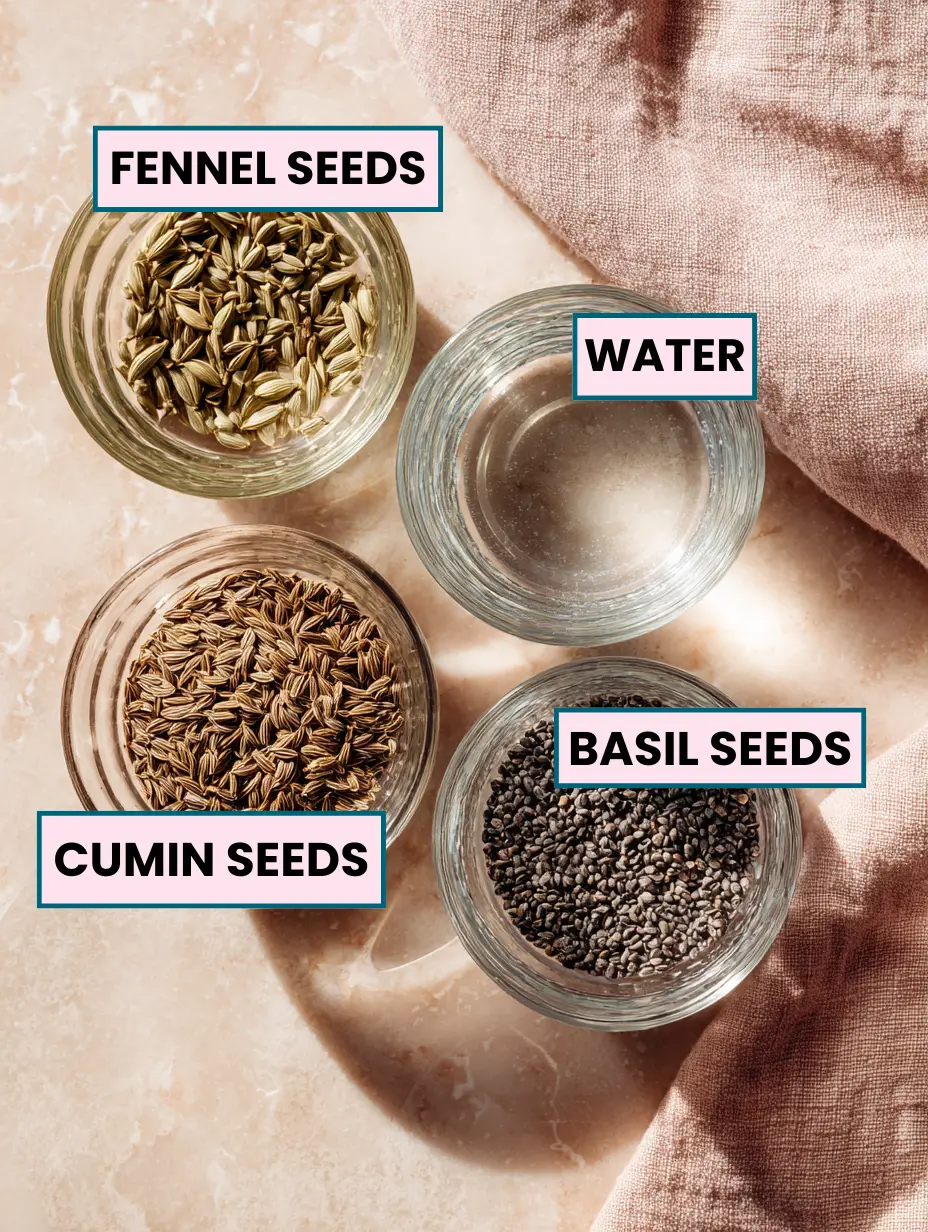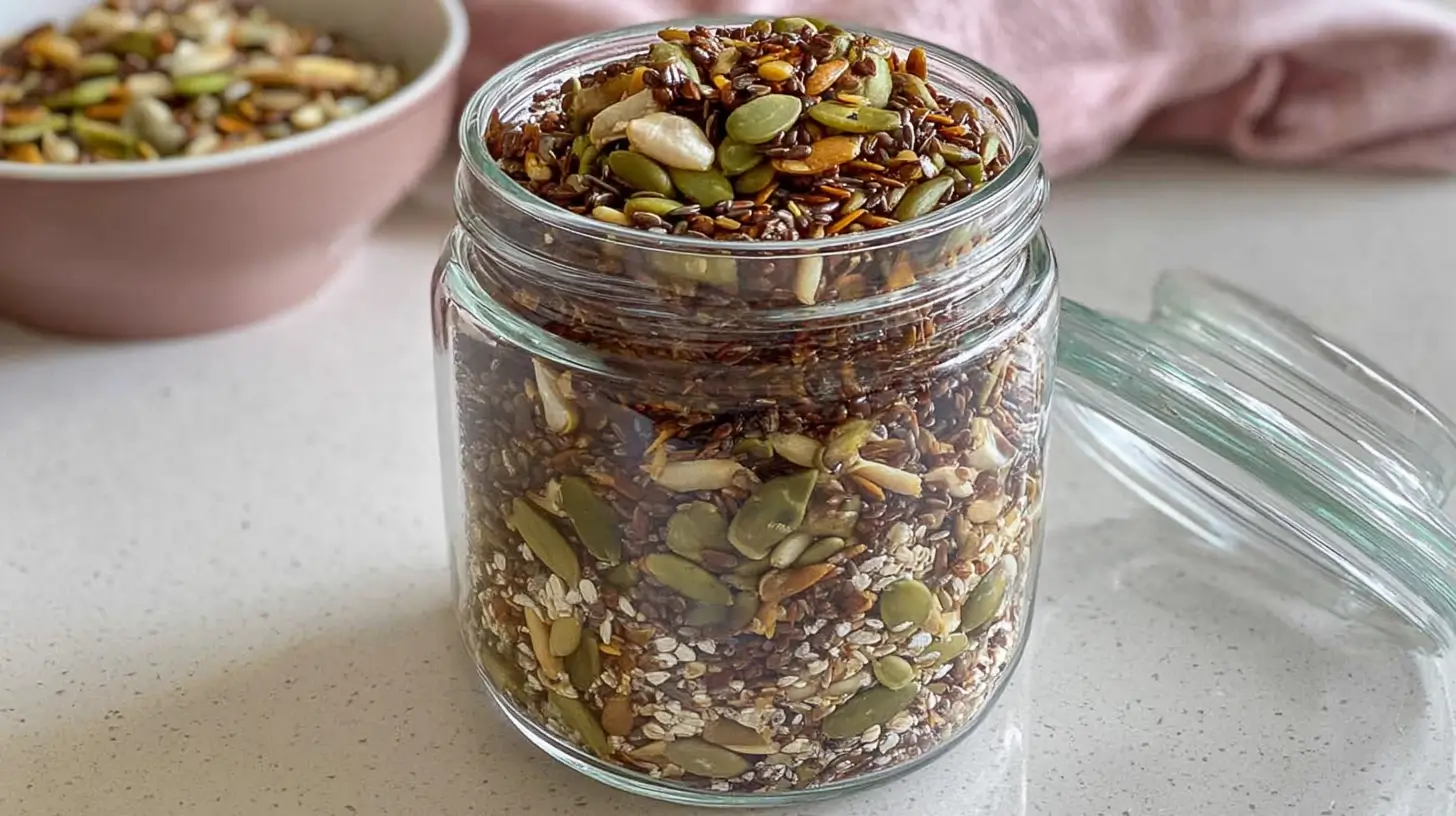This Bariatric Seed Tea Recipe is a healthy, hydrating, and digestion-friendly tea made with cumin, fennel, and basil seeds and perfect for anyone recovering from bariatric surgery or managing a sensitive digestive system. It’s one of the most calming and belly-soothing teas to sip, offering support for bloating, gas, and post-op regularity.

This bariatric seed tea recipe has become a trusted favorite in post-surgery wellness routines. It supports gentle digestion, promotes regularity, and is incredibly easy to tolerate, even during sensitive stages of recovery.
If you’re using a custom seed mix with flax, pumpkin, sunflower, and other nutritious seeds rather than making tea, you’ll want to see how it’s put together in this bariatric seed recipe .
In This Post
What Is Bariatric Seed Tea?
Bariatric seed tea is a warm, herbal infusion made from cumin, fennel, and basil seeds—each selected for their soothing, digestion-friendly properties. This tea is designed specifically with bariatric patients in mind, offering a gentle, caffeine-free drink that can help reduce bloating, ease digestion, and support hydration. It’s particularly helpful after weight loss surgery when your digestive system needs calm, supportive care without excess stimulation. Because it’s made from simple, natural seeds, it fits beautifully into many post-op dietary guidelines.
Why You’ll Love This Bariatric Seed Tea Recipe
This bariatric seed tea recipe isn’t just functional—it’s deeply comforting, quick to make, and tailored to what post-op bodies truly need.
- Supports your digestion naturally. The gentle combination of fennel, cumin, and basil seeds has been trusted for centuries to reduce bloating, ease cramping, and stimulate digestive enzymes. This tea is a natural solution that your healing body can welcome.
- Caffeine-free and hydrating. Especially important after surgery, this tea hydrates without overstimulating your system. You get the comfort of a warm drink without the potential side effects of caffeine.
- Quick to prepare. No long brewing process or complicated prep. You can have a nourishing tea ready in under 10 minutes using pantry staples.
- Customizable to your needs. Whether you want to add ginger, swap in chia seeds, or chill it for warm days, this tea adapts to your preferences and stages of recovery.
- Naturally sweet and aromatic. Fennel seeds lend a subtle sweetness that makes the tea flavorful without needing sugar or sweeteners, which many of us need to avoid post-op.
- Supports bowel regularity. The fiber in basil seeds, paired with the digestive properties of cumin and fennel, can help support smoother bowel movements and reduce discomfort.
Ingredients Needed For Bariatric Seed Tea Recipe
The power of this bariatric seed tea recipe comes from its simplicity. Each ingredient was chosen for its ability to soothe the digestive system, reduce bloating, and support hydration
- Cumin Seeds. These tiny seeds are excellent for stimulating digestive enzymes and easing stomach cramping. Go for whole cumin seeds rather than ground for this tea, and toast them lightly before adding to water for extra depth.
- Fennel Seeds. Naturally sweet and aromatic, fennel helps soothe inflammation in the digestive tract and is often used to relieve gas and bloating. Organic fennel seeds have a slightly more vibrant flavor, which can enhance your tea.
- Water. Clean, filtered water is always best when brewing medicinal or supportive teas. Using 2.5 cups lets the seeds infuse deeply while simmering.
- Basil Seeds. Often called sabja or tukmaria, basil seeds swell up when soaked and are excellent for cooling the body and promoting a sense of fullness. Soak them in water for at least 15 minutes before adding to your tea.

Disclaimer: This content is intended for informational and educational purposes only and does not constitute medical advice. Always consult with your bariatric surgeon, dietitian, or healthcare provider before introducing new foods or beverages into your post-op routine. Every individual heals differently, and your care team can help you decide what’s best for your recovery.
How I Make Bariatric Seed Tea Recipe
(This is a quick overview of how I make bariatric seed tea recipe, with tips along the way. You’ll find the full ingredients & instructions in the recipe card below.)
- Add cumin and fennel seeds to water. In a small pot, combine 1 teaspoon each of cumin and fennel seeds with 2.5 cups of water.
- Simmer gently. Bring the pot to a low boil, then immediately reduce the heat and let it simmer for 5 to 7 minutes. This allows the seeds to release their oils and active compounds.
- Strain and serve. Once the tea is fragrant and slightly golden, strain it into a mug using a fine mesh strainer.
- Add basil seeds. Stir in 1 teaspoon of pre-soaked basil seeds just before drinking. They’ll add a lovely texture and cooling contrast.
What Are the Health Benefits of Basil Seeds?
Basil seeds are rich in soluble fiber, particularly pectin, which helps you feel full longer and supports gentle digestion. They have natural cooling properties, which makes them soothing for the digestive tract—especially helpful after bariatric surgery when inflammation or irritation is common. Basil seeds also contain beneficial plant compounds that may help regulate blood sugar and support hydration.
How Long to Soak Basil Seeds for Seed Tea
For tea, soak basil seeds in room temperature water for at least 15 minutes or until they swell into their signature gel-like coating. Use a ratio of 1 teaspoon of seeds to 1/2 cup of water. If you’re making tea later, you can pre-soak them and store them in the fridge for up to 24 hours.
Expert Tips for Bariatric Seed Tea Recipe
Making a bariatric seed tea recipe may seem simple, but a few thoughtful techniques can make it even more beneficial and enjoyable.
- Soak your basil seeds properly. Let them sit in water for at least 15 minutes to fully bloom into their gel-like texture, which is easier to digest and more soothing for your gut.
- Use whole spices, not ground. Whole seeds provide a clearer tea and are easier to strain. Ground spices will make the tea gritty.
- Light toasting brings out flavor. Toast cumin and fennel seeds in a dry skillet for 30-60 seconds to unlock a deeper, richer aroma.
- Drink warm, not hot. Especially important for post-op stomachs. Lukewarm tea is more soothing and better tolerated.
- Avoid sweeteners early on. The tea has natural sweetness from fennel. If you need to sweeten, wait until you’re cleared for it.
- Try small sips first. Everyone reacts differently. Sip slowly and see how your body responds, especially in the early stages post-surgery.
Bariatric Seed Tea Recipe Variations and Substitutions
There’s no one-size-fits-all when it comes to a bariatric seed tea recipe. Different seeds, flavors, and temperatures can all offer unique digestive benefits.
- Add ginger. A thin slice of fresh ginger root adds warmth and additional digestive support. Make sure it’s peeled and sliced thin so it infuses quickly.
- Add coriander seeds. A half teaspoon of coriander seeds blends well with cumin and fennel. It’s slightly citrusy and can help with flatulence and acid reflux.
- Use ajwain (carom seeds). If tolerated, ajwain brings a sharp, thyme-like flavor and is known for its gas-relieving properties. Start with just 1/4 teaspoon.
- Add mint leaves. Drop in 2 to 3 fresh mint leaves during the last minute of simmering. It adds a cooling effect that complements basil seeds well.
- Squeeze of lemon. Once cooled slightly, a splash of fresh lemon juice can brighten the flavor and add a dose of vitamin C.
- Use chia seeds instead. If you’re out of basil seeds, soaked chia seeds offer a similar texture and gentle fiber boost.
- Make a cold version. After brewing and straining, chill the tea and serve over ice with soaked basil seeds. Great for hot summer days once you’re cleared for cooler drinks.
- Swap fennel with anise. If you enjoy a more licorice-forward flavor, anise seeds can be used in place of fennel.
When to Drink Bariatric Seed Tea for Best Results
Knowing when to enjoy this bariatric seed tea recipe can make a big difference in how effective and soothing it feels. Timing it right helps maximize digestive benefits, ease bloating, and align with post-op fluid guidelines. These gentle recommendations are tailored to support your healing process and comfort.
First thing in the morning. Drinking this tea on an empty stomach before breakfast can help wake up your digestive system, flush out toxins, and ease any overnight bloating. It’s a gentle way to start the day, especially in early recovery.
Between meals. Aim to sip it mid-morning or mid-afternoon, at least 30 minutes before or after eating. This allows the seed compounds to work on digestion and bloating without interfering with your main meals or nutrient absorption.
After a heavier meal. If you’ve had a meal that feels a little too heavy or causes bloating, wait about 30 minutes and then sip on this tea. It can help settle your gut and relieve gas.
Before bedtime (if tolerated). A warm mug of this tea can be calming and help prevent overnight bloating, but only drink it if you don’t have issues with late-night fluid intake or waking up to use the restroom. Try it earlier in the evening to test your tolerance.
Be mindful not to sip too fast or consume large quantities at once. Start with small amounts and listen to how your body responds. Consistency over time brings the best results.
Must-Knows About Bariatric Seed Tea Recipe
Before you brew your first cup, here are some essential things to know about bariatric seed tea recipe:
- It’s not a meal replacement. This tea is meant to support your hydration and digestion between meals—not replace your nutritional intake. Always follow your prescribed eating plan.
- Talk to your care team first. Even though it’s natural, any new addition to your post-op diet should be approved by your bariatric team. This ensures the ingredients are safe for your stage of recovery.
- Basil seeds expand a lot. Don’t be surprised when those little black seeds swell up into jelly-like bubbles. It’s completely normal and part of what makes the tea so hydrating and filling.
- Introduce slowly. If you’re newly post-op or have a sensitive digestive tract, sip slowly and start with smaller amounts to gauge how your body responds.
- Be consistent. Like most herbal remedies, drinking this tea regularly over time is more beneficial than expecting results from one cup.
- Stay mindful of fluid rules. If you’re in the early stages post-surgery, be sure not to drink it too close to meals or in large volumes. Follow the 30-minute rule around meals unless told otherwise.
FAQs About Bariatric Seed Tea Recipe
When is the best time to drink it?
The best times are first thing in the morning on an empty stomach or about 30 minutes after meals to help with digestion and bloating.
Can I use ground seeds instead?
It’s not recommended. Ground seeds will cloud the tea and make it gritty. Whole seeds are much better for infusing a clean, soothing brew.
Is this Bariatric Seed Tea Recipe good for constipation?
Yes, the seeds—especially fennel and basil—have mild laxative effects and can support smoother digestion. It’s a gentle option if you’re experiencing sluggish bowels post-surgery.
Are there any side effects?
It’s generally very safe. But if you experience cramping, diarrhea, or reflux, reduce the seed quantity or discontinue use and talk with your provider.
Disclaimer: This content is intended for informational and educational purposes only and does not constitute medical advice. Always consult with your bariatric surgeon, dietitian, or healthcare provider before introducing new foods or beverages into your post-op routine. Every individual heals differently, and your care team can help you decide what’s best for your recovery.
More Feel-Good Drinks
Before you get started! If you try this Bariatric Seed Tea Recipe, I’d love for you to leave a rating and review. It helps us keep sharing free recipes you can count on.

Bariatric Seed Tea Recipe
- Prep Time: 5 minutes
- Cook Time: 7 minutes
- Total Time: 12 minutes
- Yield: 1 serving
- Category: Drinks
- Method: Simmer
- Cuisine: Wellness
Description
This bariatric seed tea recipe is a warm, digestion-friendly tea made with cumin, fennel, and basil seeds. It’s soothing, naturally caffeine-free, and perfect for post-bariatric surgery hydration and bloating relief.
Ingredients
- 1 tsp cumin seeds
- 1 tsp fennel seeds
- 2.5 cups water
- 1 tsp basil seeds (soaked separately in water for at least 15 minutes)a
Instructions
- In a small pot, combine cumin and fennel seeds with water.
- Bring to a gentle boil, then reduce heat and simmer for 5–7 minutes.
- Strain the tea into a mug.
- Stir in pre-soaked basil seeds just before serving.
Notes
- Soak basil seeds in advance; they expand significantly.
- You can toast the cumin and fennel seeds lightly before boiling for extra flavor.
- Avoid sweeteners early post-op unless approved by your care team.
- Sip slowly and serve warm or lukewarm for best tolerance.
Nutrition
- Serving Size: 1 mug
- Calories: 10 kcal
- Sugar: 0g
- Sodium: 5mg
- Fat: 0g
- Saturated Fat: 0g
- Unsaturated Fat: 0g
- Trans Fat: 0g
- Carbohydrates: 2g
- Fiber: 1g
- Protein: 0g
- Cholesterol: 0mg























